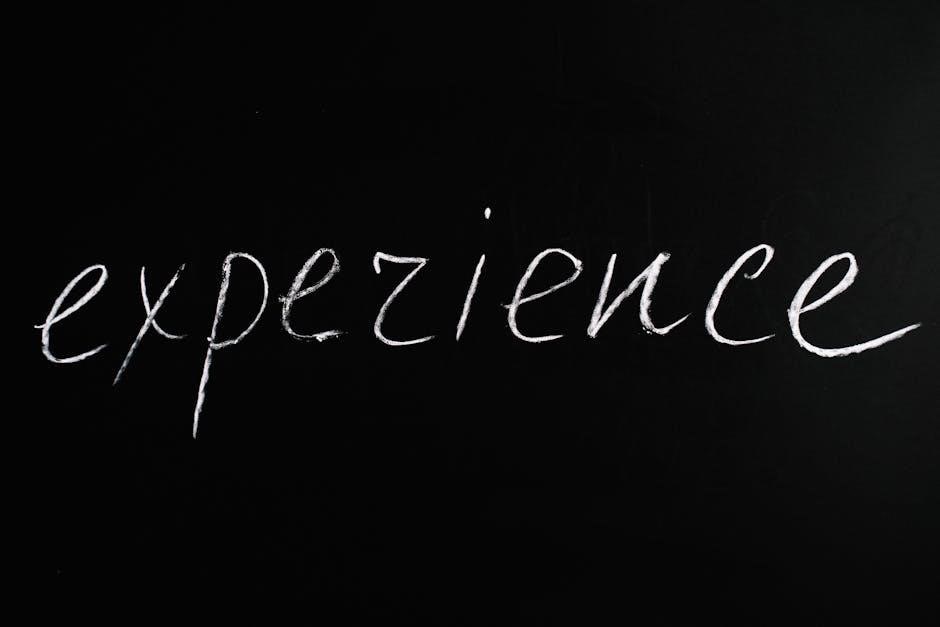learning french language for beginners pdf
Learning French for beginners is made easy with accessible resources like PDF guides, exercises, and structured lessons․ Start with basics, practice daily, and immerse yourself in French culture for a holistic learning experience․
Why Learn French?
Learning French opens doors to a rich cultural heritage, global communication, and enhanced career opportunities․ As an official language in numerous countries and international organizations, French bridges connections worldwide․ It enriches your understanding of art, literature, and cinema while offering practical benefits for travel and business․ Acquiring French skills can also boost academic and professional prospects, especially in fields like diplomacy, culinary arts, and fashion․ With resources like PDF guides and structured lessons, beginners can embark on this rewarding journey, unlocking personal growth and broadening cultural insights․
Benefits of Learning French for Travel, Work, and Personal Growth
Learning French enhances travel experiences by fostering deeper connections with locals in Francophone countries․ It boosts career opportunities in international relations, diplomacy, and industries like fashion and cuisine․ French skills also promote personal growth by expanding cultural understanding and cognitive abilities, such as memory and problem-solving․ With resources like PDF guides and online tools, beginners can efficiently master the language, making it accessible and rewarding for travel, professional advancement, and self-improvement․ These benefits create a well-rounded learning experience that enriches both personal and professional life․ Embarking on this journey with structured lessons and interactive exercises ensures steady progress and lasting results․
Overview of French Language Basics
French language basics provide a foundational understanding of pronunciation, grammar, and vocabulary․ Start with simple sentences and common phrases, focusing on correct pronunciation of vowels and consonants․ Learn essential grammar rules, such as verb conjugations and gendered nouns, to build sentence structure․ Practice basic conversations and explore cultural insights through resources like PDF guides and interactive exercises․ French basics also include understanding accents and diacritics, which are crucial for accurate spelling and pronunciation․ These fundamentals create a solid starting point for beginners, ensuring steady progress in mastering the language․ Regular practice and immersion in French materials will enhance your learning journey and improve fluency over time․
French Pronunciation Guide
Mastering French pronunciation involves understanding vowels, consonants, and accents․ Practice pronunciation tables and diacritics to improve accuracy․ Utilize free PDF resources for guided exercises and clear explanations․
Understanding French Vowels and Consonants
Mastering French vowels and consonants is essential for accurate pronunciation․ French vowels include sounds like /a/, /e/, /i/, /o/, and /u/, often modified by accents․ Consonants vary, with some resembling English sounds, while others, like /r/, differ significantly․ Pronunciation guides in PDF resources provide detailed tables and exercises to practice these sounds․ Focus on diacritics, such as è, ô, and ç, which alter pronunciation․ Regular practice with audio aids and exercises from free PDF books helps build confidence․ Understanding these basics lays a strong foundation for speaking French clearly and correctly;
Mastering French Accents and Diacritics
French accents and diacritics, such as ç, è, ô, û, é, and à, are crucial for correct pronunciation and meaning․ PDF guides provide detailed tables and exercises to learn these symbols․ For example, the cedilla (ç) softens the “c” sound, while grave accents (è, à) and acute accents (é) modify vowel sounds․ Practice with audio aids and exercises from free PDF books helps build confidence․ Understanding these markings ensures proper pronunciation and avoids misunderstandings․ Regular practice with pronunciation guides and exercises is essential for mastering French accents and diacritics effectively․
Practice Exercises for Improving Pronunciation
Improving French pronunciation requires consistent practice with targeted exercises․ PDF guides offer pronunciation tables, audio aids, and drills to refine vowel sounds, consonant distinctions, and intonation․ Beginners can start with simple exercises like repeating words with accents and diacritics, such as è, é, and ô․ Listening to native speakers and mimicking their speech helps develop an ear for correct pronunciation․ Flashcards and interactive apps also provide daily practice opportunities․ Regular practice of nasal vowels and difficult consonants, like “u” and “r,” builds confidence․ Consistent effort with these exercises ensures mastery of French sounds and fluency in speech․

Basic French Grammar
Mastering French grammar begins with understanding parts of speech, sentence structure, and gender rules․ PDF guides provide clear lessons on verbs, nouns, and essential sentence formation for beginners․
French parts of speech are the building blocks of language, including nouns, pronouns, verbs, adjectives, adverbs, prepositions, and conjunctions․ PDF guides for beginners provide clear definitions and examples, helping learners understand each category’s role in sentence formation․ Nouns represent people, places, and things, while pronouns replace them for simplicity․ Verbs express actions or states, and adjectives describe nouns․ Adverbs modify verbs, adjectives, or other adverbs․ Prepositions show relationships between words, and conjunctions connect phrases or clauses․ Mastering these elements is essential for constructing grammatically correct sentences․ PDF resources often include exercises to practice identifying and using each part of speech effectively, making learning interactive and engaging for beginners․
Understanding French Sentence Structure
French sentence structure typically follows a Subject-Verb-Object (SVO) order, similar to English․ However, French grammar includes specific rules, such as adjective placement and pronoun usage․ Most adjectives come after the noun they describe, unlike in English․ Adverbs often precede the verb or follow it, depending on context․ Prepositions are crucial for indicating relationships between words․ PDF guides for beginners provide clear examples and exercises to practice constructing simple and complex sentences․ Many resources include lessons on question formation, negative sentences, and common phrases to help learners build confidence․ These materials emphasize practical usage, making sentence structure accessible and engaging for those starting their French language journey․
Gender Rules in French Nouns
In French, nouns are either masculine or feminine, and this gender affects adjectives, articles, and pronouns․ Most nouns ending in -age, -ment, or -isme are masculine, while those ending in -tion, -ité, or -esse are often feminine․ Some nouns, like le livre (book) and la vie (life), have fixed genders․ PDF guides for beginners provide exercises to identify and memorize noun genders․ Understanding gender is crucial for proper sentence structure and adjective agreement․ For example, le chien (masculine) becomes le chien noir, while la maison (feminine) becomes la maison noire․ Regular practice with these rules helps learners master French grammar effectively․

French Vocabulary Building
French vocabulary building begins with common words and phrases found in PDF resources․ Learn essential terms for travel, work, and daily life to establish a strong foundation․
Common French Words and Phrases for Beginners
Mastering common French words and phrases is essential for beginners․ Start with greetings like “Bonjour” (Hello), “Merci” (Thank you), and “Au revoir” (Goodbye)․ Learn basic expressions for introducing yourself, such as “Je m’appelle” (My name is) and “Je suis désolé(e)” (Sorry)․
Practice essential phrases for shopping, dining, and directions, like “Combien ça coûte?” (How much does it cost?) and “Pouvez-vous m’aider?” (Can you help me?)․
Download free PDF resources to discover more phrases and exercises tailored for beginners, ensuring a smooth start to your French learning journey․
Learning Numbers and Basic Counting in French
Mastering numbers and counting in French is a fundamental step for beginners․ Start with basic digits: un (1), deux (2), trois (3), up to dix (10)․ Learn to count up to vingt (20) and beyond, including trente (30), quarante (40), and cinquante (50)․
Discover how to form numbers like 21 (vingt-et-un) and 45 (quarante-cinq)․ Use free PDF guides to practice counting and basic arithmetic in French․
These resources often include exercises and quizzes to help reinforce your understanding of French numbers and counting․
Mastering basic greetings and introductions in French is crucial for beginners․ Start with common phrases like Bonjour (hello), Salut (hi), and Coucou (hey)․ Learn formal greetings such as Bonjour, comment ça va? (hello, how are you?) and informal ones like Ça va? (how’s it going?)․
Introduce yourself with Je m’appelle (my name is) and ask others with Comment tu t’appelles? (what’s your name?)․ Practice phrases like D’où viens-tu? (where are you from?) and Je suis de (I am from)․
Use free PDF guides to practice these essential greetings and introductions with exercises and pronunciation tips․
Family and Relationships Vocabulary
Learning family and relationships vocabulary in French is essential for beginners․ Start with basic terms like mère (mother), père (father), frère (brother), and sœur (sister)․ Expand to more specific terms like fille (daughter), fils (son), époux (husband), and épouse (wife)․
Explore extended family terms such as grand-mère (grandmother), grand-père (grandfather), and cousin (cousin)․ Use free PDF resources to practice these words with exercises and visual aids, helping you build a strong foundation in French family vocabulary․
French Verbs and Tenses
Mastering French verbs and tenses is crucial․ Start with regular verbs, then tackle irregular ones․ Use PDF guides for conjugation charts and practice exercises to build confidence․
French verbs are categorized into regular and irregular types․ Regular verbs follow predictable patterns in conjugation, such as -er, -ir, and -re verbs․ Irregular verbs, however, do not follow these patterns and must be memorized․ For beginners, understanding the differences is key to constructing sentences effectively․ PDF guides and practice exercises provide clear conjugation charts, making it easier to grasp these concepts․ Start with common regular verbs like parler (to speak) and finir (to finish), then gradually explore irregular verbs such as être (to be) and avoir (to have)․ Regular practice ensures mastery of both types․
Present Tense Conjugation in French
Mastering present tense conjugation is essential for beginners․ Regular verbs like parler (to speak) follow predictable endings: je parle, tu parles, il parle, nous parlons, vous parlez, and ils parlent․ Irregular verbs like être (to be) and avoir (to have) require memorization․ PDF guides provide conjugation charts for practice․ Focus on common verbs first, such as aller (to go) and faire (to do), which are used frequently․ Regular practice with exercises ensures fluency in forming sentences․ Start with regular patterns, then gradually incorporate irregular verbs to build a strong foundation in French conjugation․
Common Irregular Verbs for Beginners
Irregular verbs are a key part of French grammar․ Begin with essential verbs like être (to be) and avoir (to have), which are used frequently․ Their conjugations don’t follow standard patterns, so memorization is crucial․ For example, je suis (I am) and j’ai (I have)․ Other common irregular verbs include aller (to go), faire (to do), and venir (to come)․ PDF guides and exercise books provide comprehensive lists and practice exercises․ Regular practice helps build confidence․ Start with high-frequency verbs and gradually expand your list․ Mastery of these verbs will enhance your ability to form complex sentences and communicate effectively in French․
Free French Language Learning Resources
Access numerous free PDF books, exercises, and guides to learn French․ Websites offer downloadable materials, flashcards, and interactive tools for effective language acquisition at no cost․
Best PDF Books for Learning French
Discover a variety of free PDF books designed for French learners, offering structured lessons, grammar guides, and vocabulary exercises․ These resources are ideal for self-study and include interactive elements like flashcards and pronunciation tips․ Popular titles provide comprehensive coverage, from basic phrases to advanced grammar, making them suitable for all skill levels․ Many books are tailored for travelers, professionals, and hobbyists, ensuring relevance to different learning goals․ Additionally, some PDFs include cultural insights, helping learners connect language with context․ Whether you prefer detailed explanations or concise cheat sheets, these books are invaluable companions for mastering French efficiently and enjoyably․
French Language Exercise Books and Worksheets
Enhance your French learning journey with exercise books and worksheets available in PDF format, offering a wide range of activities tailored for beginners․ These resources include grammar drills, vocabulary quizzes, and writing exercises, designed to reinforce foundational skills․ Many books feature step-by-step lessons, allowing learners to progress at their own pace․ Worksheets often cover essential topics like verb conjugation, sentence structure, and pronunciation, providing practical practice․ Additionally, some resources incorporate interactive elements, such as flashcards and revision exercises, to make learning engaging․ These materials are perfect for self-study or classroom use, helping you build confidence and proficiency in French effectively․
Online Resources for French Beginners
Discover a wealth of online resources designed specifically for French beginners, offering flexible and engaging learning opportunities․ Websites like Litres provide e-books in PDF, EPUB, and FB2 formats, while platforms such as FrenchPod101 offer free PDF lessons and cheatsheets․ Additionally, video series like French in Action cater to both visual and auditory learners․ Many online resources include interactive exercises, flashcards, and quizzes to practice vocabulary and grammar․ Some platforms also offer structured courses with daily lessons and revision sessions․ These resources are ideal for self-paced learning, allowing you to build a strong foundation in French from the comfort of your home․
Interactive Learning Methods
Interactive learning methods include PDF lessons, video tutorials, and exercises․ Resources like FrenchPod101 and French in Action offer engaging ways to learn and improve French․
Using Language Learning Apps
Language learning apps provide interactive and flexible tools for mastering French․ Apps like Duolingo and Babbel offer bite-sized lessons, interactive exercises, and progress tracking․ They cater to various learning styles, making French accessible anywhere․ Many apps include features like pronunciation practice, vocabulary building, and grammar drills․ Some, such as FrenchPod101, offer PDF lessons and audio resources for offline learning․ These apps are ideal for beginners, allowing them to learn at their own pace․ Additionally, apps often incorporate gamification, making the learning process engaging and fun․ They are a modern and effective way to supplement traditional study methods and stay motivated on your French learning journey․
French Flashcards for Vocabulary Building
French flashcards are an excellent tool for building vocabulary effectively․ They provide a visually engaging way to memorize words, phrases, and their meanings․ Many resources offer free, downloadable PDF flashcards, ideal for printing or digital use․ Flashcards often feature bilingual text, allowing learners to practice pronunciation and retention․ They cover essential topics like greetings, numbers, and common phrases․ Repetition is key, and flashcards make it easy to review words frequently․ Portable and versatile, they can be used anywhere for quick study sessions․ Popular resources like FrenchPod101 also offer PDF lessons that complement flashcard learning․ This method is perfect for beginners seeking to expand their vocabulary efficiently and confidently․ Flashcards are a timeless and effective study aid for French learners at any level․
Language Exchange Programs for Practice
Language exchange programs are an excellent way for beginners to practice French in real-life conversations․ These programs connect learners with native French speakers, fostering mutual language learning․ Many online platforms offer structured exchange opportunities, while PDF guides and workbooks provide additional support for vocabulary and grammar․ Cultural insights are also gained through these interactions, enhancing overall understanding․ Programs often include practical exercises and tips for effective communication․ Beginners can benefit from the flexibility of these exchanges, which can be tailored to their skill level․ Regular participation helps build confidence and improves speaking skills․ These programs are a valuable complement to traditional study materials, making language learning interactive and engaging․ They are particularly effective for those seeking to apply their knowledge in authentic contexts, ensuring a well-rounded learning experience․

Setting Goals for French Learning
Set clear objectives for learning French, such as mastering basic vocabulary or conversing confidently․ Use PDF guides and structured lessons to track progress and stay motivated effectively․
Why Goal Setting is Important
Goal setting is essential for effective French learning as it provides direction and motivation․ By defining clear objectives, learners can track progress, stay focused, and celebrate achievements․ PDF guides and structured lessons help break down goals into manageable steps, ensuring steady improvement․ Whether aiming to master basic vocabulary or converse confidently, having a roadmap enhances commitment and success․ Regularly reviewing and adjusting goals keeps learners motivated and aligned with their aspirations․ This structured approach ensures that beginners stay on track and make consistent progress in their French language journey․
Creating a Study Plan for French
Developing a structured study plan is crucial for mastering French․ Begin by breaking down your learning into manageable chunks, such as weekly goals for grammar, vocabulary, and pronunciation․ Utilize PDF guides and online resources to organize your schedule, allocating specific times for lessons, exercises, and practice․ Incorporate diverse activities like listening to French music, watching movies, and engaging in language exchanges to enhance immersion․ Regularly review and adjust your plan to ensure it aligns with your progress and interests․ A well-organized study plan helps maintain consistency, accelerates learning, and keeps you motivated throughout your French language journey․
Tracking Progress and Staying Motivated
Tracking your progress is essential to staying motivated while learning French․ Use PDF guides and exercise books to monitor your improvement in grammar, vocabulary, and pronunciation․ Set achievable milestones, such as mastering a set of verbs or completing a chapter in a PDF textbook․ Celebrate small victories to maintain enthusiasm․ Regularly review your notes and exercises to identify areas for improvement․ Leverage online resources and apps to track your learning journey․ Surround yourself with positive reinforcement, whether through language exchange partners or supportive study groups․ Consistent progress tracking helps you stay focused, motivated, and aware of your advancements in French language acquisition․

Cultural Immersion in French Learning
Cultural immersion enhances French learning by engaging with music, movies, cuisine, and conversations․ Use PDF guides to explore French traditions and practices, deepening your language understanding through cultural context․
Listening to French Music and Podcasts
Listening to French music and podcasts is an engaging way to improve pronunciation and comprehension․ FrenchPod101 offers free PDF lessons and audio resources that complement your learning journey․ Tune into French music genres like chanson française to familiarize yourself with accents and rhythms․ Podcasts tailored for beginners, such as “French for Beginners” or “News in Slow French,” provide structured lessons and cultural insights․ These resources, often paired with downloadable PDF guides, help you practice vocabulary and grammar in context․ Regularly listening to native speakers enhances your ability to mimic intonation and pick up colloquial expressions, making your learning experience more immersive and enjoyable․
Watching French Movies and TV Shows
Watching French movies and TV shows is a dynamic way to immerse yourself in the language․ Platforms like Netflix offer beginner-friendly content with subtitles, such as “Emily in Paris” and “Lupin;” French films like “Amélie” and “Intouchables” provide cultural insights and vocabulary in context․ Many of these shows come with downloadable PDF guides or companion resources that highlight key phrases and expressions․ Additionally, websites like YouTube offer channels dedicated to teaching French through movie clips and series․ This method enhances listening skills and helps learners understand conversational French․ Pairing visual learning with auditory input makes language acquisition more engaging and effective for beginners․
Cooking French Cuisine for Cultural Insight
Cooking French cuisine offers a unique way to immerse yourself in the culture while learning the language․ By following French recipes, you can discover new vocabulary related to food, cooking techniques, and meal traditions․ Many PDF guides and cookbooks combine recipes with language lessons, teaching phrases like “ingredients nécessaires” (necessary ingredients) and “étapes de préparation” (preparation steps)․ This hands-on approach makes learning engaging and practical․ Popular dishes like Coq au Vin and Crème Brûlée provide opportunities to practice pronunciation and understand cultural nuances․ Cooking also reinforces grammar and vocabulary in a fun, edible way, making it a delicious path to language mastery․
Mastering French starts with the right resources․ PDF guides, exercises, and structured lessons provide a clear path for beginners․ Consistent practice and cultural immersion ensure successful language acquisition․
Summarizing Key Points for Beginners
Learning French for beginners starts with essential resources like PDF guides and exercise books․ These materials cover pronunciation, grammar, and vocabulary․ Practice daily with structured lessons and free online tools․ Focus on mastering basic concepts, such as vowel sounds and common verbs․ Utilize flashcards and language apps for effective vocabulary building․ Engage in cultural immersion through music, movies, and cooking to enhance understanding․ Set clear goals and track progress to stay motivated․ Regular practice and consistent study are key to successful French language acquisition․ These foundational steps will help beginners build a strong base for further learning and fluency․
Encouragement to Continue Learning
Stay motivated by celebrating small achievements, like mastering a new verb or understanding a French song․ Use free PDF resources and online tools to keep learning fun and engaging․ Consistency is key, so set aside time each day for practice․ Surround yourself with French through music, movies, and conversations․ Every effort brings you closer to fluency, so embrace challenges and enjoy the journey․ Remember, learning French opens doors to new cultures and opportunities․ Keep pushing forward, and you’ll see progress over time․ Your dedication will pay off, making the process rewarding and fulfilling;
Final Tips for Successful French Language Acquisition
Combine structured learning with immersion by using PDF guides, video series, and apps like FrenchPod101․ Practice consistently, even for short periods, to build habits․ Use flashcards for vocabulary memorization and engage in language exchanges for real conversation practice․ Immerse yourself in French media, such as music, podcasts, and movies, to enhance listening skills․ Set achievable goals, like mastering a new tense or learning weekly, and track progress․ Stay motivated by celebrating milestones and reminding yourself of your goals․ Engage with native speakers to refine pronunciation and gain cultural insights․ Mix learning methods to keep it fun and effective, ensuring steady progress toward fluency․


